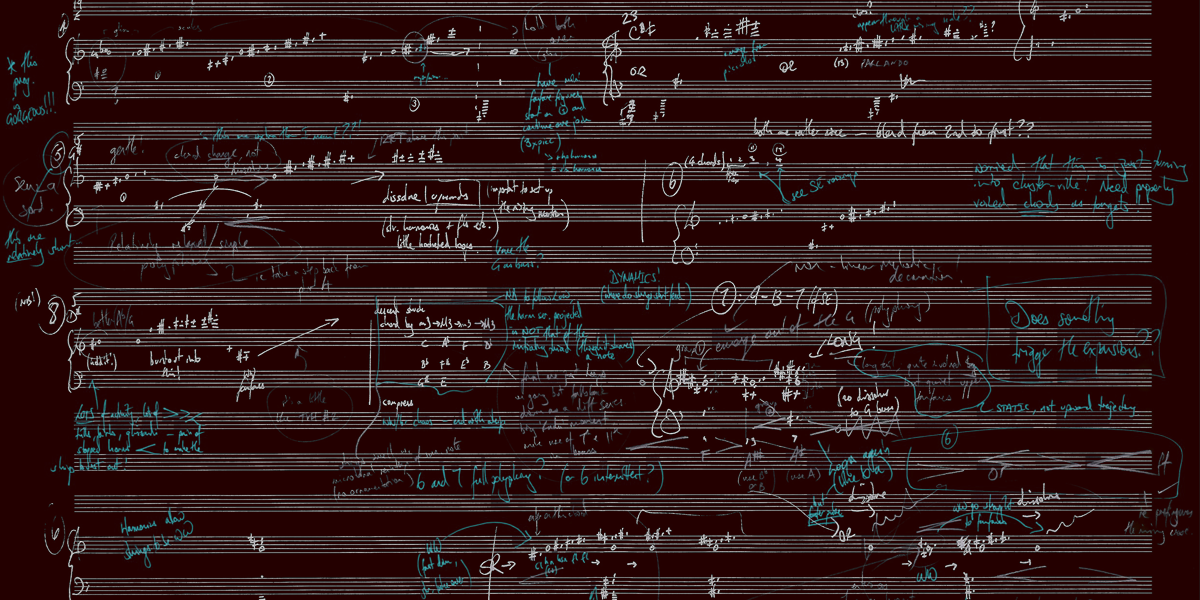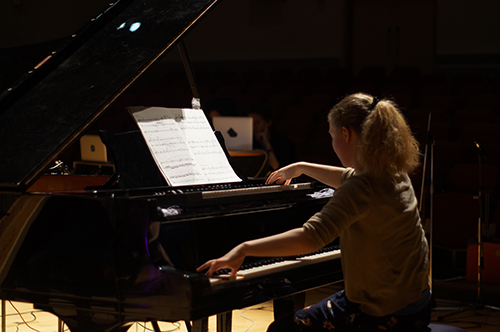View semester dates
2 years part-time

Define your own unique compositional voice.
Year of entry: 2026 (September)
Discovering your compositional voice and presenting it with clarity in compelling, innovative music is a lifelong project. Our MA is designed to help you develop the skills to pursue this, whatever your career aspirations.
Our internationally-renowned composition staff work across a range of styles and media and our students are similarly diverse. Solo or orchestral music, electronic or acoustic, notated, improvised or devised – all of these are valued at York. You'll encounter a wide variety of approaches, but no prescriptions.
You'll join a lively community of postgraduate composers and the rich creative environment of the School of Arts and Creative Technologies, receiving one-to-one tuition and studying the established and emerging techniques in this exciting and constantly developing field.
Contemporary music has been a cornerstone of the Department since its foundation. From early visits from Cage, Feldman and Shostakovich and the creation of pioneering electroacoustic works by Trevor Wishart and Dennis Smalley to the Proms commissions, Glastonbury appearances and international tours of recent alumni such as Anna Meredith, Kerry Andrew and Grawemeyer Award winner Christian Mason, York has a long history of nurturing extraordinary talent.
Over the year, through seminars, concerts, workshops and individual lessons you will encounter a wide array of contemporary music to expand your musical horizons. You will interrogate the techniques by which this music is created, both to acquire the tools and to question the assumptions on which they are based. You will develop your practice across instrumental, vocal and (live-)electronic media, and there will be workshop performance opportunities by visiting professional musicians and Artists-in-Association. Supporting modules will help you articulate your work in terms of practice research and develop the critical awareness and writing skills to be able to do this effectively.
You will benefit from York’s vibrant performance culture, our long history of innovative practice-based teaching and research, and our lively and supportive community of students and staff. This course is designed to produce innovative, free-thinking graduates with the knowledge, skills, and critical understanding needed for higher degrees and for a range of prestigious graduate careers in music and other related disciplines.

*You can choose to study one of these modules per semester. The others will be available as option modules.
You'll also study one option module, or alternatively complete the Extended Creative Practice Portfolio as your final project. Examples of option modules may include:
Some option module combinations may not be possible. The options available to you will be confirmed after you begin your course.
Our modules may change to reflect the latest academic thinking and expertise of our staff, and in line with Department/School academic planning.
You'll complete a creative practice portfolio of one or more compositions of total duration 17-25 minutes (25-35 minutes if you decide to complete the Extended Creative Practice Portfolio). You'll also complete a critical commentary of up to 2000 words articulating the work as practice research.
Some option module combinations may not be possible. The options available to you will be confirmed after you begin your course.
Every course at York is built on a distinctive set of learning outcomes. These will give you a clear understanding of what you will be able to accomplish at the end of the course and help you explain what you can offer employers. Our academics identify the knowledge, skills, and experiences you'll need upon graduation and then design the course to get you there.
The MA in Music Composition is a great opportunity to immerse in postgraduate studies, in an encouraging environment of committed teachers with a variety of approaches and areas of expertise, and in interaction with a diverse group of classmates developing very interesting projects.
| Study mode | UK (home) | International and EU |
|---|---|---|
| Full-time (1 year) | £12,000 | £27,250 |
| Part-time (2 years) This is the year 1 fee. Fees for future years are subject to confirmation. |
£6,000 | £13,625 |
Students on a Student Visa are not currently permitted to study part-time at York.
For courses which are longer than one year, the tuition fees quoted are for the first year of study.
UK (home) or international fees? The level of fee that you will be asked to pay depends on whether you're classed as a UK (home) or international student. Check your fee status.
Find out more information about tuition fees and how to pay them.
Discover your funding options to help with tuition fees and living costs.
We'll confirm more funding opportunities for students joining us in 2026/27 throughout the year.
If you've successfully completed an undergraduate degree at York you could be eligible for a 10% Masters fee discount.
We are pleased to work with Chevening Scholars to offer funding for our Masters programmes. Chevening Scholarships provide one year of fully-funded postgraduate study in the UK for international (including EU) students. The scholarships are open to early and mid-career professionals who have the potential to become future leaders.
You’ll work with world‐leading academics who’ll challenge you to think independently and excel in all that you do. Our approach to teaching will provide you with the knowledge, opportunities, and support you need to grow and succeed in a global workplace.
Teaching is delivered through a combination of individual lessons, group lessons, seminars, composition workshops and presentations from visiting performers and composers.
You will have regular meetings with your supervisor, who will advise you and help develop your ideas as you progress through your studies.
We encourage you to get involved with our lively community, from our ensembles to our weekly seminars, performance classes and research seminars.
The School is home to the Music Research Centre, one of the finest facilities for listening to and recording sound in the UK. There is a large-scale neutral listening and performing space built to extremely low noise specifications (PNC15), a linked studio suite containing a dedicated performance space with configurable acoustics and two mix down/control rooms (one with an SSL Duality console). These facilities include a wide range of microphones and recording hardware/software.
The School houses two concert halls: The Sir Jack Lyons Concert Hall and the Rymer Auditorium. Through involvement with composition workshops and departmental ensembles, composition students can expect to hear their work performed in these venues.
All students have free access to Sibelius.
You will be based in the School of Arts and Creative Technologies, which has three main buildings of specialist facilities. Your teaching will take place both in the Music buildings on Campus West and in the Ron Cooke Hub on Campus East.
Our beautiful green campus offers a student-friendly setting in which to live and study, within easy reach of the action in the city centre. It's easy to get around campus - everything is within walking or pedalling distance, or you can always use the fast and frequent bus service.
The focus of your assessments will be your own compositions alongside other work that supports your compositional development, which, depending on the options you choose, may also include essays, presentations and/or performance. Feedback occurs frequently, both within individual lessons and in group seminars and workshops where you will share and discuss your work with fellow students.
By the end of the course, you'll have a firm understanding and facility across a range of approaches to contemporary composition. You will be able to use this to develop independent creative outputs, whether these are led by your own artistic voice or are responses to specific briefs from collaborators. You'll also be able to reflect critically on your creative decisions, and communicate your ideas about composition in writing and speech, skills that are highly valued in any sector. MA Music graduates go on to a diverse range of careers as creative artists and teachers, as well as administrative work and further study at both universities and conservatoires.

York prepared me for my career by allowing the time and freedom of thought necessary and inherent to any freelance life, and especially in allowing me to embark on the substantial/ambitious projects which enabled my career to get going in the first place.
| Qualification | Typical offer |
|---|---|
| Undergraduate degree | 2:2 or equivalent in Music or another relevant subject. |
| Other international qualifications | Equivalent qualifications from your country |
You will need to attach scores or a link to a portfolio of 2-3 recent compositions for different forces which demonstrate your ability as a composer. Scores in PDF format, and recordings of these if available. If the music is solely electronic then no score is required. Please see our guidance on submitting creative work.
If English isn't your first language you may need to provide evidence of your English language ability. We accept the following qualifications:
| Qualification | Minimum requirement |
|---|---|
| IELTS (Academic and Indicator) | 6.5, minimum 6.0 in each component |
| Cambridge CEFR | B2 First: 176, with 169 in each component |
| Oxford ELLT | 7, minimum of 6 in each component |
| Oxford Test of English Advanced | 136, minimum 126 in each component |
| Duolingo | 120, minimum 105 in all other components |
| LanguageCert SELT | B2 with 33/50 in each component |
| LanguageCert Academic | 70 with a minimum of 65 in each component |
| Kaplan Test of English Language | 478-509, with 444-477 in all other components |
| Skills for English | B2: Merit overall, with Pass with Merit in each component |
| PTE Academic | 61, minimum 55 in each component |
| TOEFL | 87, minimum of 21 in each component |
| Trinity ISE III | Merit in all requirements |
For more information see our postgraduate English language requirements.
You may be eligible for one of our pre-sessional English language courses. These courses will provide you with the level of English needed to meet the conditions of your offer.
The length of course you need to take depends on your current English language test scores and how much you need to improve to reach our English language requirements.
After you've accepted your offer to study at York, we'll confirm which pre-sessional course you should apply to via You@York.
Get in touch if you have any questions




